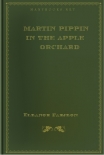Martin Pippin in the Apple Orchard by Eleanor Farjeon (top 10 novels to read .TXT) 📗

- Author: Eleanor Farjeon
Book online «Martin Pippin in the Apple Orchard by Eleanor Farjeon (top 10 novels to read .TXT) 📗». Author Eleanor Farjeon
One evening as they sat in the garden in the last week of May, Ambrose said to his brother, "I have been thinking, Hobb, that at all costs Heriot must be found, and not for his own sake only. He is younger than we, and nearer in spirit to the boys; and he may be able to help them as we cannot. For if this goes on, Hugh will die of his fears and Lionel of his melancholy. You must stay and administer our affairs as usual, and look after the boys; and I will go further afield in search of Heriot."
Hobb was silent for a moment, and then he sighed and said, "No good has come of these seekings. Our lads returned of themselves, as Heriot may. And their return was worse than anything we feared of their absence, as, if he come back, I pray Heriot's will not be. And for you, Ambrose--" But then he paused, not saying what was in his mind. And Ambrose said, "Do not be afraid for me. These boys are young, and I am older than my years. And though I cannot face danger with a stouter heart than our brothers, I can perhaps see into it a little further than they. And foresight is sometimes a still better tool than courage."
Then he took Hobb's hand in his, and they gripped with the grip of men who love each other; and Ambrose went out of the garden, and Hobb was left alone. For Hugh and Lionel were companions to none but themselves.
But on the first of June Hobb, coming to the gate of his garden, saw with surprise a peacock strutting on the hillbrow, his fan spread in the sun, a luster of green and blue and gold, and behind him was another, and further south three more. So Hobb went out to look at them, and found not five but fifty peacocks sweeping the Downs with their heavy trains, or opening and shutting them like gigantic magical flowers. Following the throng of birds, he came shortly to a barn already known to him, but he had never seen it as he saw it now. For the roof was crowded with peacocks, and peacocks strayed in flocks within and without; and sitting in the doorway was Heriot, the sight of whom so overjoyed his brother that Hobb forgot the thousand peacocks in the one man. And he made speed to greet him, but within a few yards halted full of doubt. For was this Heriot? He had Heriot's air and attitude, yet the grace was gone from his body; and Heriot's features, surely, but the beauty had melted away like morning dew. And his dress, which had always been orderly and beautiful, was neglected; so that under the half-laced jerkin Hobb saw that he was shirtless. Yet after the first moment's shock, he knew this gaunt and ugly youth was Heriot. And Heriot seeing his coming hung his head, and made a shamed movement of retreat into the shadow of the barn. But Hobb hurried to him, and took him by the shoulders, and beheld him with the eyes of love which always find its object beautiful. Then the flush faded from Heriot's haggard cheeks, and he looked as full at Hobb as Hobb at him. And as at the steadfast meeting of eyes men see no longer the physical appearance, but for an eternal instance the appearance of the soul, these brothers knew that they were to each other what they had always been. And Heriot saw that Hobb was full of questions, and he laid his hand over Hobb's mouth and said, "Hobb, do not ask me anything, for I can tell you nothing."
"Neither of yourself nor of Ambrose?" said Hobb.
"Nothing," repeated Heriot.
So Hobb left his questions unspoken, and as they went home together told Heriot of Hugh's return, and what had happened to him. And Heriot heard it without comment. And in the evening, when Lionel and Hugh returned, they had nothing to say to Heriot, nor he to them; and it seemed to Hobb that this was because these three everything was understood.
It was a lonely June for Hobb, with his eldest brother away, and the three others spending all their days beside their strange possessions, which brought them no tittle of joy; and had it not been for his garden he would have felt utterly bereft. Yet here too failure sat heavily on his heart; for an many a night he saw upon his bush a bud that promised perfection to come, and in the morning it hung dead and rotten on its stem.
So the month wore on, and Hobb began to feel that the Burgh, where now his brothers only came to sleep, was a dead shell, too desolate to inhabit if Ambrose did not soon return. And he was impelled to go in search of him, yet decided to remain until Ambrose's birthday had dawned, for had not their birthdays brought his three youngest brothers home? And it might be so with Ambrose. And so it was.
For on the first of July, before going to his garden, he stayed at Heriot's barn to try to induce him to leave his peacocks for once, and spend the day with him in search of





Comments (0)